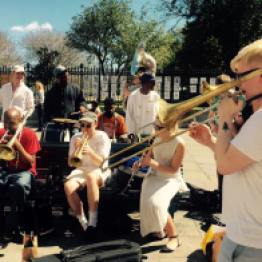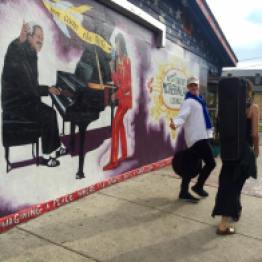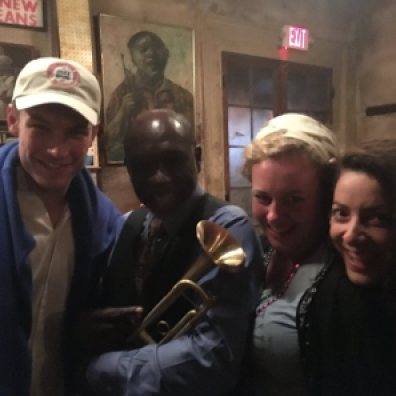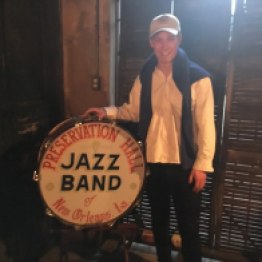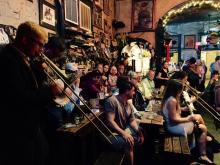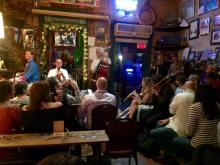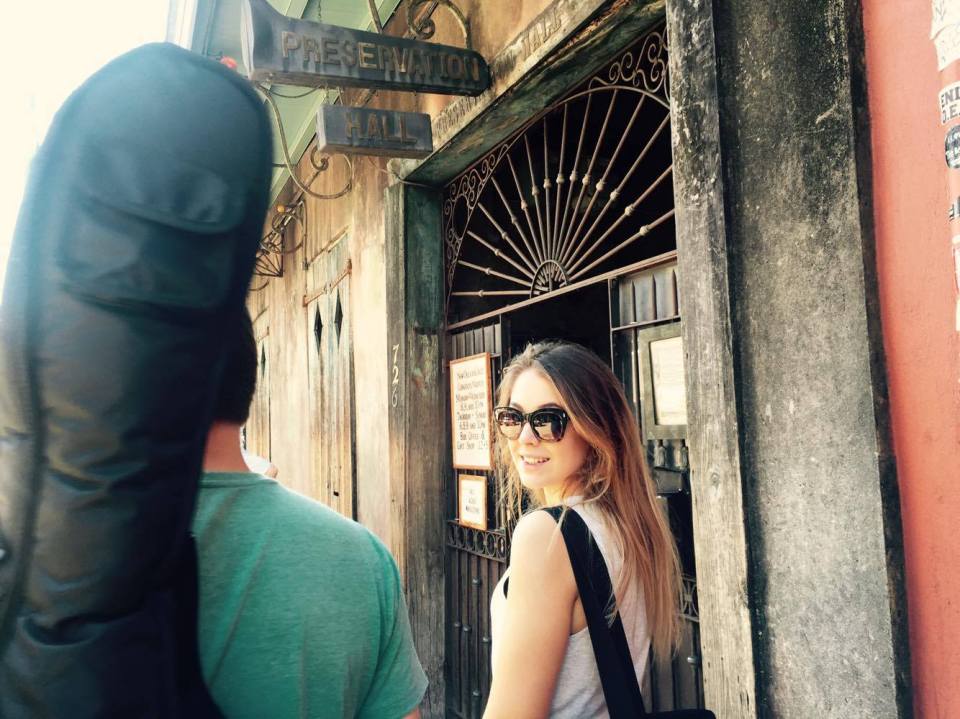The fifth section of our interview on the 23rd February 2017 with Leroy Jones, Freddie Lonzo, Joe Lastie and Louis Ford at The Preservation Hall, New Orleans.
(Missed part 4? Click here to read it.)
Tom: Do you think another Louis Armstrong could come around and revolutionize music like he did?
Leroy: Well, there will never be another Louis Armstrong.
Freddie: I haven’t seen him yet!
Leroy: Nah, there will never be another Louis Armstrong, but there’s so much talent – there’s a lot of talent around and you know, what I´m saying is the greatest individual at any given thing that they might do, you´ve never heard of because they never got an opportunity to get exposed. A break. So, you know, half the battle is what you know and half of it is who you know. So you know, you have musicians and artists that you´ve never even heard of but they’re so gifted – and then some of them have decided that that’s not really what they want to do! But they have it – the gift. Those really special people, like Armstrong – he had contemporaries, but he was in the right place at the right time too, I think. And he took it to a level that it had not been taken to before. I’m speaking like 1920-21, 1923 through 1933, that period. And you know, the pre-Swing, Big Band, pre-Bop period and all of that stuff. And you can hear…first comes the hearing, then comes the speaking. So you can´t have a concept if you haven’t heard anything. You know, there’s no way. You have to, like a baby leaning to speak, it needs to hear its parent, or hear someone speak to them. That’s how they learn to speak. And with jazz, with music and in particular jazz, it’s the same thing – you have to have a frame of reference – a point of reference. Your influences may be many, but eventually, when it comes out of you, the listener should be able to hear who you’ve been listening to. You know, I mean, in essence. But you take those things and you make them unique to yourself. You take that lingo and you make it…you have your own way of putting it that makes it special and individual, and as special as Louis Armstrong was, as an individual. As jazz musicians, you want to have your own individual sound that distinguishes you from, you know, as a vocalist, you don´t sound like Anita Baker, you don’t sound like Ella Fitzgerald, you don’t sound like Lena Horne – you sound like you. You know what I mean.
Louise: Which is a mix of all of that, plus your own understanding.
Leroy: Yeah, you have to have a concept of interpreting the music.
Louis: There’s something I would like to add to that – It wasn’t always peaches and cream with Louis. Being an African American in an all-white, you know, how he was treated, but New Orleans is known for overcoming adversity, and he overcame that. So you guys are gonna have to think of that as well, you know. For example, what you guys are going through right now with that split – I don’t know what the economy is going to look like in the future. They say it’s gonna be this, it’s gonna be that, you don’t know – but don’t give up your dreams with your music. If there’s a jazz club started up today, and then next month because of the economy it’s gonna shut down, that means you’re gonna shut down. Don’t do that. Keep on keeping on. Focus on that instrument, you know, because some day you’re gonna overcome that adversity, okay? You understand what I’m saying? Because that’s what it is here. It’s not always peaches and cream here. We go through seasonal hurricanes. Not just hurricanes – lately, we’ve been going through tornados, which is something new to us!
Louise: I heard about that one a couple of weeks ago, that was shocking!
Louis: Yeah, yeah right! So we have to be prepared for anything that comes our way, and we have to overcome that and get back on that horse. Don’t let anyone or anything discourage you from what you wanna do, your ambitions in life.
Louise: Very wise words.
Tom: We love the music we play but in our small little circles in London sometimes we feel like we’re kind of blamed, I don’t know if you feel the same, for being musically conservative – I just wondered what you guys thought about that and the music that you play compared to other jazz musicians.
Leroy: You getting fire from the modernists?
Tom: Yeah, yeah!
*laughter*
Tom: How do you feel about that in this country as well?
Leroy: Well, you know, there’s that vibe sometimes as well. But New Orleans is different from the rest of the United States in general in that we have Mardi Gras Indians, we have Brass Bands, we play Secondline music that people are dancing to, rhythms and beats. I mean, it’s like something that you don’t witness anywhere else in this country or in any other country in the same manner. For us, I was told a long time ago by Danny Barker, and also an old piano player by the name of Frank Moliere. They said “Learn those tunes and you will never be out of work.” So learn those songs, the standards and the New Orleans standards, traditionals and you will always be working! And I raise my hand up and I say that I have always worked – there have been times when it’s been a little slow, and you travel and stuff, and you always have a gig. But if I had played with some no-name, top 40 band, cover band, I might have had a little gig on Bourbon Street for a week or two and then they fire the band, another band came in – you know, they’re a dime a dozen. People would come here, and they still come here I think, for jazz – for New Orleans jazz. For traditional jazz. And swing. As opposed to going to some loud club on the corner that’s got a band playing Slade or The Rolling Stones or some music that’s so loud for one thing that you can’t even hold a conversation.
Tom: Yeah, amen!
Leroy: So there’s still hope for us – I think, if you´re playing this music and you’ve got a repertoire, you’re playing these tunes, you can go anywhere and play. And you don’t have to be someone that’s super famous, because you have a repertoire and you can go play – you know, you can work with different people. It’s a universal language, as you know, you can work with different people. I’ve worked with bands where half of the band…I didn’t speak Hungarian and they spoke other languages but we played music together. We understood the chords, the harmonies and the melodies and the rhythm so that’s all I had. And, you know what I mean, there´s a beauty to this music that we chose, that we love – that you chose, that you love – that makes it special in a way that a lot of other idioms…they can’t come close to being the same. I think, you know, just like Louis said, don´t be disheartened. Can you imagine how we feel with Donald Trump as our President?
*groans of disgruntlement all round*
Leroy: I mean, it’s an embarrassment beyond words!
Louise: We’ve been having to bite our tongue on planes and stuff because we don’t know what the general attitude is…
Tom: We were saying “Don’t talk about politics when you go through customs!”
*laughter*
Leroy: Yeah, just “Yes, we love America, Donald Trump is the greatest!” – yeah, bite your tongue!
Laura: It just feels like there are many aspects of the west, if you want to call it that, that are regressing – it’s just like a huge regression, politically, but within music is the freedom. It´s a universal language – the journey, the evolution. Spiritual freedom.
Freddie: Yes, definitely spiritual too.
To be continued







 Luckily, The Preservation Hall was only a short walk from our hotel, so we had ample time to bide. In the distance we could hear the faint sounds of a brass band, so took a stroll down the street towards it.
Luckily, The Preservation Hall was only a short walk from our hotel, so we had ample time to bide. In the distance we could hear the faint sounds of a brass band, so took a stroll down the street towards it. us was to hold; The sun was shining, the music was swinging and everybody was smiling.
us was to hold; The sun was shining, the music was swinging and everybody was smiling.


